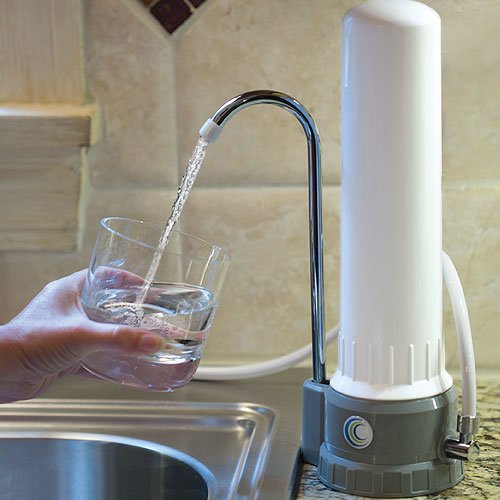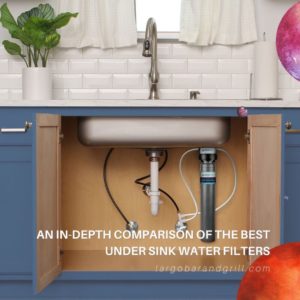Disclaimer: There are affiliate links in this post. At no cost to you, I get commissions for purchases made through links in this post.
A countertop water filter is a compact water filtration system that sits on top of a countertop or table and is designed to remove impurities from drinking water. These filters are an affordable and convenient way to improve the taste and quality of tap water without the expense of a whole-house filtration system.
Countertop water filters come in a variety of sizes and styles and use different filtration technologies to remove impurities such as chlorine, sediment, heavy metals, and bacteria. They are easy to install, require minimal maintenance, and can be a great alternative to bottled water or more expensive filtration systems.
What is countertop water filter?
A countertop water filter is a water filtration system that sits on a countertop or table and is designed to remove impurities from drinking water. These filters are an affordable and convenient way to improve the taste and quality of tap water without the expense of a whole-house filtration system.
Countertop water filters come in various sizes and styles and use different filtration technologies to remove impurities such as chlorine, sediment, heavy metals, and bacteria. They are typically easy to install, require minimal maintenance, and can be a great alternative to bottled water or more expensive filtration systems.
Countertop water filters can be a good option for those who want to improve the taste and quality of their tap water without the need for a more complex or expensive filtration system. They can also be a good option for renters or those who cannot make modifications to their plumbing.
Are countertop water filters any good?
Yes, countertop water filters can be a great way to improve the taste and quality of tap water. They are effective at removing a variety of impurities including chlorine, sediment, heavy metals, and bacteria. Countertop water filters are typically easy to install and maintain, and they are often more affordable than larger, more complex filtration systems.
However, the effectiveness of a countertop water filter can vary depending on the specific model and the quality of the tap water being filtered. Some models may not be as effective at removing certain impurities, and they may require more frequent filter replacements to maintain their effectiveness.
It is important to choose a reputable brand and to carefully read the manufacturer’s instructions to ensure that the countertop water filter is properly installed and maintained. In general, countertop water filters can be a good option for those who want to improve the taste and quality of their tap water without the expense of a larger filtration system.
What is the best water filter for a countertop?
The best water filter for a countertop depends on a variety of factors, including your water source, water quality, budget, and personal preferences. Here are some popular types of countertop water filters to consider:
- Gravity-Based Water Filters: These filters are popular and use gravity to filter water through a combination of activated carbon, sediment filters, and other technologies. They are affordable, require no electricity, and can be effective at removing impurities from water.
- Reverse Osmosis (RO) Filters: These filters use a membrane to remove impurities from water, including dissolved solids, heavy metals, and bacteria. They are highly effective but can be more expensive to install and maintain.
- Ceramic Filters: These filters use a ceramic material to filter water and can be effective at removing impurities. They are durable and can be cleaned and reused, but may not be as effective as other types of filters.
- Carbon Block Filters: These filters use activated carbon to remove impurities like chlorine, pesticides, and herbicides from water. They are affordable and easy to maintain but may not be as effective as other types of filters.
When choosing a countertop water filter, consider factors like water quality, budget, and personal preferences. It is also important to choose a reputable brand and to follow the manufacturer’s instructions for installation and maintenance.
What are the pros and cons of countertop water filter?
Countertop water filters offer a variety of benefits, but there are also some potential drawbacks to consider. Here are some of the pros and cons of using a countertop water filter:
Pros:
- Improved water quality: Countertop water filters are effective at removing impurities like chlorine, sediment, heavy metals, and bacteria from tap water, which can improve the taste and quality of the water.
- Convenience: Countertop water filters are easy to install and require minimal maintenance. They can be a convenient alternative to bottled water or larger filtration systems.
- Cost-effective: Countertop water filters are typically more affordable than larger, more complex filtration systems, and can be a good option for those on a budget.
- Portability: Countertop water filters are portable and can be moved from room to room, making them a good option for renters or those who don’t want to make modifications to their plumbing.
Cons:
- Limited capacity: Countertop water filters typically have a limited capacity and may need to be refilled frequently, especially if they are used for cooking or other household tasks.
- Limited filtration: Some countertop water filters may not be as effective at removing certain impurities, especially compared to larger, more complex filtration systems like reverse osmosis filters.
- Aesthetics: Countertop water filters can take up space on a countertop or table, and some people may not like the look of the filter.
- Maintenance: While countertop water filters require minimal maintenance, they do need to be regularly cleaned and the filter replaced, which can be an added expense and inconvenience.
Overall, countertop water filters can be a good option for those looking for an affordable and convenient way to improve the taste and quality of their tap water. However, it’s important to consider the specific needs of your household and choose a filter that is right for you.
Why use countertop water filter?
There are several reasons why someone might choose to use a countertop water filter:
- Improved water quality: A countertop water filter can remove impurities from tap water, such as chlorine, sediment, heavy metals, and bacteria, which can improve the taste and quality of the water.
- Convenience: Countertop water filters are easy to install and require minimal maintenance, making them a convenient option for those who want to improve the quality of their drinking water without a lot of hassle.
- Affordability: Countertop water filters are typically more affordable than larger filtration systems, making them a good option for those on a budget.
- Portability: Countertop water filters are portable and can be moved from room to room, which can be helpful for renters or those who don’t want to make modifications to their plumbing.
- Environmentally friendly: Using a countertop water filter can reduce the need for single-use plastic water bottles, which can help to reduce waste and protect the environment.
Overall, a countertop water filter can be a convenient and affordable way to improve the quality of your drinking water and reduce your environmental impact.
How to install countertop water filter
Installing a countertop water filter is a relatively simple process that can typically be completed in just a few minutes. Here are the basic steps to follow:
- Choose a location: Decide where you want to place your countertop water filter. It should be on a level surface and close enough to your faucet for the tubing to reach.
- Remove aerator: Unscrew the aerator from your faucet and set it aside. Keep track of any washers or adapters that may be attached to the aerator.
- Install diverter valve: Attach the diverter valve that came with your countertop water filter to the end of your faucet. If necessary, use any adapters or washers provided by the manufacturer to ensure a tight fit.
- Connect tubing: Attach the tubing that came with your countertop water filter to the diverter valve. Run the tubing to the countertop filter unit and connect it to the inlet valve. The inlet valve may be located on the bottom or back of the filter unit.
- Run water: Slowly turn on your faucet and let the water run for a few minutes to flush out any air or debris that may have collected in the tubing.
- Install filter cartridge(s): Follow the manufacturer’s instructions to install the filter cartridge(s) into the filter unit. Some models may have multiple cartridges that need to be installed in a specific order.
- Test the system: Turn on your faucet and check for any leaks or drips around the filter unit and diverter valve. If everything looks good, you’re ready to use your new countertop water filter!
Be sure to read and follow the manufacturer’s instructions carefully to ensure that your countertop water filter is installed correctly and functions properly.
Factors when choosing the best countertop water filter
When choosing the best countertop water filter, here are some factors to consider:
- Filtration effectiveness: Look for a filter that removes a wide range of contaminants, including bacteria, chlorine, pesticides, and heavy metals. Check the product specifications and certifications to make sure it meets your water quality needs.
- Filter lifespan: Consider how often you’ll need to replace the filter cartridges and how easy it is to do so. A longer filter lifespan can save you money in the long run, but may come with a higher upfront cost.
- Water flow rate: Some filters may have a slower flow rate, which can be frustrating if you need to fill a large container quickly. Look for a filter with a fast enough flow rate to meet your needs.
- Size and capacity: Countertop water filters come in a range of sizes, so consider how much space you have available on your countertop. Also, consider the capacity of the filter, which determines how much water it can filter before needing to be refilled.
- Ease of installation: Look for a filter that is easy to install and doesn’t require any specialized plumbing skills or tools. Many countertop filters simply attach to your existing faucet.
- Maintenance and cleaning: Consider how easy it is to clean and maintain the filter, as well as how often you’ll need to do so. Some filters may require more frequent cleaning than others.
- Brand reputation and customer support: Look for a brand with a good reputation for quality and reliability. Also, check for customer support options such as warranties, manuals, and online resources in case you need assistance.
How long do countertop water filters last?
The lifespan of a countertop water filter can vary depending on the specific model and usage habits. Some countertop water filters have a lifespan of around 6-12 months or up to 10,000 gallons of water, while others may last longer.
It is important to follow the manufacturer’s instructions for filter replacement, as using a filter beyond its recommended lifespan can result in decreased filtration effectiveness and may even result in the growth of bacteria.
In addition to regular filter replacement, proper maintenance and cleaning of the filter unit can also help to prolong its lifespan and ensure optimal performance.
When should I replace countertop water filter?
The manufacturer’s recommendations for when to replace a countertop water filter can vary depending on the specific model and type of filter. In general, most countertop water filters require replacement every 6-12 months or after filtering a certain number of gallons of water.
It’s important to follow the manufacturer’s recommendations for filter replacement, as using a filter beyond its recommended lifespan can result in decreased filtration effectiveness and may even result in the growth of bacteria.
In addition, if you notice a decrease in water flow rate, foul odors or taste, or any other issues with the performance of your countertop water filter, it may be time to replace the filter or clean the unit according to the manufacturer’s instructions.
How to clean countertop water filter
The process for cleaning a countertop water filter can vary depending on the specific model and type of filter. However, in general, the following steps may help:
- Turn off the water supply to the filter unit.
- Remove the filter cartridge(s) from the unit according to the manufacturer’s instructions. This may involve unscrewing a filter housing or simply sliding the cartridge out of the unit.
- Rinse the filter housing and all other removable parts of the filter unit with warm, soapy water.
- If there are any stubborn stains or build-up, use a soft-bristled brush to gently scrub the affected areas.
- Rinse all parts thoroughly with clean water.
- If your filter unit has a pre-filter, remove it and replace it with a new one according to the manufacturer’s instructions.
- Reassemble the filter unit and replace the filter cartridge(s) according to the manufacturer’s instructions.
- Turn on the water supply to the filter unit and allow the unit to run for a few minutes to flush out any remaining soap or debris.
Always refer to the manufacturer’s instructions for specific information on how to clean your countertop water filter.
How to maintain countertop water filter properly
Maintaining your countertop water filter properly is important to ensure that it continues to function effectively and provide you with clean, safe drinking water. Here are some tips to help you maintain your countertop water filter properly:
- Follow the manufacturer’s instructions: Always read and follow the manufacturer’s instructions for your countertop water filter. This will help you understand how to properly use and maintain your filter.
- Replace filters regularly: Replace the filter cartridge(s) in your countertop water filter according to the manufacturer’s recommended schedule. This is typically every 3-6 months, depending on usage and water quality.
- Check for leaks: Regularly check your countertop water filter for any leaks or damage. If you notice any issues, contact the manufacturer for assistance.
- Clean the filter housing: Periodically clean the filter housing and any other removable parts of your countertop water filter with warm, soapy water. Use a soft-bristled brush to gently scrub away any dirt or debris.
- Keep it dry: After cleaning or replacing the filter cartridge(s), make sure that all parts are completely dry before reassembling the filter unit.
- Use the right water temperature: Use water that is at room temperature or cooler with your countertop water filter. Hot water can damage the filter and reduce its effectiveness.
By following these tips, you can help ensure that your countertop water filter is well-maintained and continues to provide you with clean, safe drinking water.
How to remove countertop water filter
The process for removing a countertop water filter can vary depending on the specific model and type of filter. However, in general, the following steps may help:
- Turn off the water supply to the filter unit.
- Disconnect the filter unit from the faucet or water supply line.
- Remove the filter cartridge(s) from the unit according to the manufacturer’s instructions. This may involve unscrewing a filter housing or simply sliding the cartridge out of the unit.
- If the unit has multiple filter cartridges, be sure to note their order and orientation, as this will be important when replacing them.
- Once the filter cartridge(s) have been removed, clean the unit according to the manufacturer’s instructions.
- If you plan to store the filter unit, make sure it is fully dry before storing in a cool, dry place.
- If you plan to replace the filter cartridge(s), be sure to purchase the correct replacement cartridge(s) for your specific filter unit and follow the manufacturer’s instructions for installation.
Always refer to the manufacturer’s instructions for specific information on how to remove and replace your countertop water filter.
Troubleshooting about countertop water filter
Some common issues that may arise with a countertop water filter include:
- Slow Flow Rate: If the water flow from your countertop filter is slow, it may be due to a clogged filter. Try replacing the filter or cleaning the unit according to the manufacturer’s instructions.
- Leaking: If your countertop filter is leaking, check to make sure all connections are tight and properly sealed. If the leak persists, it may be due to a damaged or worn out O-ring or gasket, which may need to be replaced.
- Foul Odors or Taste: If your filtered water has a strange odor or taste, it may be due to a clogged or worn out filter. Replace the filter or clean the unit according to the manufacturer’s instructions.
- No Water Flow: If water is not flowing from your countertop filter at all, check to make sure the unit is properly connected and that the water supply is turned on. If the issue persists, it may be due to a clogged or damaged filter.
If you are unable to resolve the issue with basic troubleshooting, it may be necessary to contact the manufacturer for further assistance or to schedule a repair or replacement.
Are countertop reverse osmosis filters effective?
Countertop reverse osmosis (RO) filters can be effective at removing a wide range of impurities from water, including heavy metals, chemicals, and bacteria. Reverse osmosis is a process that uses a semi-permeable membrane to remove impurities from water, and is considered one of the most effective water filtration methods available.
However, it is important to note that not all countertop RO filters are created equal. Some models may have limitations on the types of impurities they can remove, and may not be as effective as larger, more comprehensive filtration systems. Additionally, countertop RO filters may have a slower flow rate than other types of filters, and may require more frequent maintenance to ensure optimal performance.
If you are considering a countertop RO filter, it is important to do your research and choose a model that is specifically designed for countertop use and is effective at removing the impurities that are of concern to you. You may also want to consider the maintenance requirements and flow rate of the filter before making a purchase.
Related Posts
Best Countertop Water Filter – A Comprehensive Buying Guide
Disclaimer: There are affiliate links in this post. At no...
Read MoreAn In-Depth Comparison Of The Best Under Sink Water Filters
Disclaimer: There are affiliate links in this post. At no...
Read MoreAre You Drinking Clean Water? 9 Questions To Ask Before Buying A Water Filter
Disclaimer: There are affiliate links in this post. At no...
Read MoreWhy Trust Us
You will find what you are looking for at Largo Bar and Grill. From classic to luxury brands, you'll find both. We will help you to select appliances that fit your needs, budget and lifestyle. Whether you want to stop by to learn more — or plan to make a major purchase — we’ll treat you like family and assist you every step of the way. Shop with us today to receive friendly and experienced help along the way.




